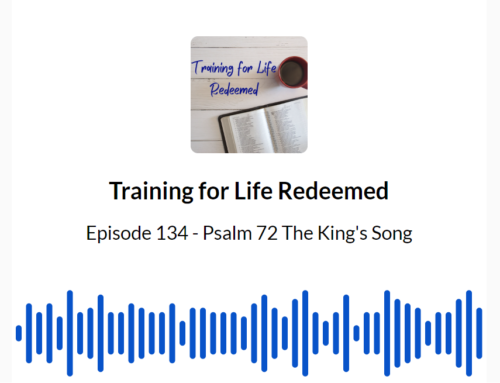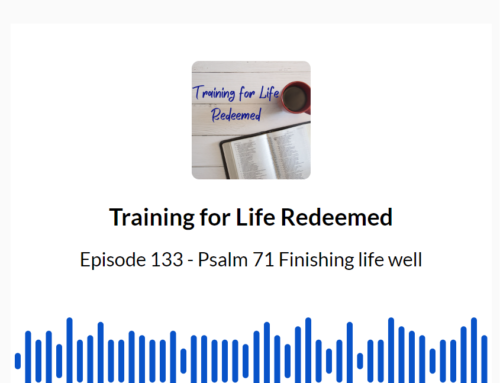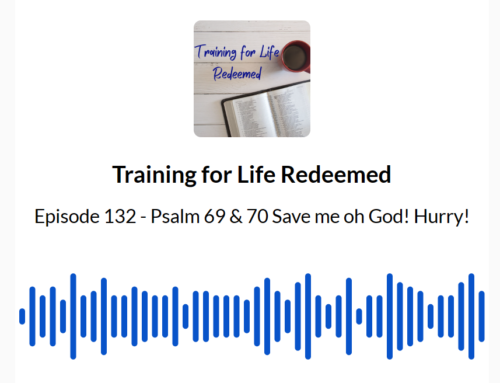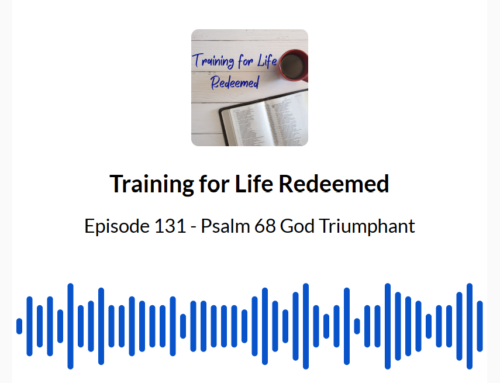Grab your notes for this episode by completing the form
and we will send you the link to all our notes.
Jesus taught us to manage our limitations. It takes understanding of the gospel and a disciplined trust in God. This is a song to sing when we reach our limit.
[0:00] Dan Hi everyone and welcome to training for life redeemed. I’m here with my father David Jackson We’re going to be chatting all about Psalm 61 today, dad Tell us a little bit about some context for Psalm 61 Yeah We had a bit of a debate earlier about whether or not David’s in Masada or not and you’re like it’s got their word in It but we realize that’s from another time, But there is stuff about being quite high up in a shelter and strongholds and that kind of stuff And if you’re in Israel If you’re talking about a stronghold, there’s not too many that you would actually classify as a stronghold that’s up high an eyrie and Masada’s, You know, it’s It’s an amazing. It’s an amazing stronghold. I don’t know how anyone managed to capture it, It is an amazing place
David So the context for this is you’ve got a series of psalms Psalm 61 to 64 that are going to go through David’s. [0:51] Just the struggle that he had to become king and And of course, when you read, you know, 1 and 2 Samuel, and you’re following the story of David, it’s, yeah, how he ever got to be king and lasted long enough to do anything is amazing. But it was, you know, being chased around the bush for seven years or ten years, and then you become king for 40, and in the middle of that, you’re chased out and chased back again. It’s just, it’s a horrendous lifestyle in many ways.
But it’s a picture of the lifestyle of Jesus, and it’s nothing that a Christian wouldn’t. [1:32] Expect to experience in the Christian life. So there’s this pattern that just keeps recurring for God’s people in the old covenant, or God’s king in the old covenant, for Jesus, the ultimate king, and then for the king’s people. This is the pattern where we go into a world that is enemy territory, effectively.
And the Psalms are really the emotional roller coaster that we go through. And they just serve this wonderful purpose of helping us to keep life in perspective.
[2:07] Dan Yeah, and this definitely has a lot of emotional exhaustion in it. I quite like that the line about exhausted hearts in verse two, I think, is when my heart is exhausted, guide me into the heir that rises high above me. And that’s not AIR., eyrie, however you want to say it, “Get me out of here.” We better read it. We should. Let’s read the psalm.
Psalm 61
0 For the director.
Upon stringed instruments.
Of David.
1 Hear my cry, O God.
Pay attention to my prayer.
2 From the end of the earth, I will cry to you,
When my heart is exhausted.
Guide me into the eyrie that rises high above me.
3 For you are a shelter for me,
A strong tower away from the advancing enemy.
4 I will stay as a refugee in your tent forever.
I will seek refuge hiding under your wings. Selah.
5 For you, O God, heard my vows.
You allocate the inheritance of those who fear your name.
6 You will extend the king’s days.
His years are for generation after generation.
7 He will stay forever before God.
Appoint faithfulness and truth.
They will preserve him.
8 This is why I will sing praise to your name forever,
So that I complete my vows every day.
Dan So, you’ve heard the verse now, you’ve heard the verse, we’ve hit verse 2 there, that talks about our exhausted heart stat. And I think one of the things that’s really important as we go into this time is what to do when we are that exhausted. When life really is that tough, when all these difficulties are happening to you or have happened to you and you’re trying to work things out.
Our culture likes to work on the outside, or they’ll tell you that they’re working on the inside, work on yourself, and think about who you are, but in a pagan way, think about who you are, in that sense of, they’re talking about finding yourself and all that kind of stuff.
Be yourself. Be yourself. You deserve it.
There’s so much. I can, when we’re dealing with real hardships. [4:27] Curbing behaviour or doing external things isn’t going to fix it. And so, I love how this really talks about that exhausted feeling and then what you do afterwards and that’s coming to God.
David Yeah, I think if one of the things you notice when you’re my age is the winds of, the cultural shifts that come, like a wind, a change of wind when you’re out at sea. And you know, when you’ve been teaching for 40 years, you know, the winds come and the winds change, and sometimes you feel like it’s a pendulum.
But these last 15, nearly 20 years, there’s been this horrendous direction that’s just been relentless that drives us back into ourselves. And so you listen to all the language. I was listening this morning on the news and it was this great research, you know, people who do PhDs on stupid things, but they’re doing this huge research project for the Department of Health or somebody to prove that if, If you’ve suffered great trauma, of course you’re going to be stressed.
[5:44] If you work too hard, you’re going to be stressed. And it’s all mental health.
[5:50] And we’ve just reclassified everything so that it’s all sort of focused internally into me. And if it’s all in me and there’s no God, where do you go? And the answer is, you blank it out.
So when I am at my wits end, where do I go? And all I hear in all the well-being programs and everything else that is getting pumped out of all these big research projects, is that I should go into a quiet place somewhere, lie down, do my breathing, empty my brain, it’s all very Buddhist.
But the answer’s in me, and if what’s going on in me is anxiety and emotional exhaustion and trauma and everything else, I’ve got to empty me, which basically boils down to stop thinking about it and think about nothing. And then you wake up and it’s still there. Alcohol is an emotional anaesthetic, or a mental anaesthetic. Drugs do the same. Meditation doesn’t do much different.
These songs are where we turn that around, where we actually go somewhere where there’s an answer. [7:16] And that’s, you know, Christians do reach this exhaustion. [7:23] And if you read your Bible in any sort of a decent literal translation, you keep coming across people who are sitting there having some very hard conversations with God.
[7:38] And that’s good. That’s a good thing to do.
Dan Yeah, I think one of the things that comes through in the psalm, like, yes, you’re exhausted, but then you’re coming to God as your stronghold. And we talked a little bit before here about, you know, society likes to focus on outside-in type solutions to problems.
David So what’s outside-in?
Dan So outside-in is, you’re looking at things around you. So I’m going to I try and fix a behaviour, I’m trying to adjust things that are external to me, basically.
[8:15] And for me, even some of the books that I read, aren’t specifically Christian, I’ve already worked out that that actually isn’t going to fix anything. Particularly if you’re dealing with this kind of persecution type stuff, to deal with that You can’t just put up barriers, you can’t just give your army weapons, that’s not going to fix the issue. And so what it talks about instead is to focus on things that you do have control about, but going back to who you really are and getting a correct paradigm, essentially, is part of what it’s about.
Coming back to you and go, am I viewing this from the right perspective? And for us as Christians we then check that against the Bible and we go, what’s God teaching around this type of stuff? And so for David here, his paradigm is that God is his stronghold. [9:15] God looks after his people, I am his anointed one, and even though Saul is also an anointed one at the moment, and is the current king and David is going to replace him, he has, to trust in God and he has to come to him, so he has got these prayers about trusting in him, God is my refuge, he is faithful, I am going to be faithful too, and the truth is really important.
So he is focusing on who he is in God and how that should impact how he behaves and, his character, because your character, aligning how you behave with the correct paradigm, then produces a good character basically. And so it’s that kind of process of David’s coming to God, remembering who he is, then. [10:01] Lining up God’s paradigm and his paradigm to then match and identify his character with his behaviours. And he’s like, I come to God because God is the one who’s going to save me. I don’t come to all my men. He’s not going to his men and going, oh, woe is me, Saul’s chasing me, come on guys, let’s all go fight Saul.
He’s saying, no, Saul’s God’s anointed one at the moment. He’s chasing me because the Spirit’s left him, the Spirit’s now with me, type of stuff. And I know God’s going to keep me alive because I am his anointed one, but at the same time I’m being hunted. And so you come to God with that and you rest. This bit here in verse 7 where he says, he will stay forever before God appointed faithfulness and truth.
They will persevere him and so he’s like, he’s coming back to himself being faithful and truth and knowing that that actually is just about lining up his character with God’s character and how God is faithful and truth as well.
David Yeah, and this is the difference between I’m in this world on my own and if I can’t manage the externals, I’ll run away from the externals, and I end up running into myself. And when I get into myself, there’s no answers. So at that point, I just go numb.
[11:18] One of the things that Christians wrestle with, I think, and it’s probably the question behind the question in this song, is, okay, God, there’s a line in Tevye, I love Fiddler on the Roof, good musical, and he’s poor and his cow’s broken down and it’s a bad day, right, and the Russians are going to kick him out of the village and everything else, and he’s in this rather interesting soliloquy talking to God, He says, you know, it’s a wonderful thing that we are your chosen people, but for a couple of days, could you choose somebody else? You know, it’s no shame to be poor, but it’s no great honour either.
[12:05] Being a believer and being in God’s world, in a fallen world, is hard. And sometimes you sort of look at it and say, if you’re a God of love, why is this my life?
And some people react to that by telling God to go jump in the lake. You obviously must hate me and storm off. But where do you storm off to?
You storm off to a world of fantasy. You don’t solve the problem.
So David is saying, no, if I’m going to solve this problem, if I’m going to get through this, I only have one place to go. My refuge is Yahweh because he is the one that’s doing all of this. He talks about, God allocates our inheritance.
[13:00] Well, our inheritance is our lot in life, as well as where we end up.
So God has written the story, I’m a character in his story, and part of that story is all this stuff that’s happening to me, and I can honestly look at most of that and say, you know, this isn’t my fault, I’m not being punished. But I still don’t like it. It’s still painful. So where do I go? I go to the Lord and I say, You are my refuge. My only way of looking at this is to know that there’s a reason for it. There’s a good reason for it. It’s for Your glory that makes it worth it. And if it’s worth it, then somehow I’ve got to get through this. And if I’m going to get through this, well, the only way I can get through this is if you help me.
[13:51] So you are my refuge, you’re my shelter, you’re where I go. I don’t meditate on my navel, I don’t sit here emptying my brain. I get to know you better. And this is the song that says, I don’t understand what’s happening. It’s all driving me into the ground. I’m tired of running, I’m tired of fighting, I’m tired of thinking. I just want to come and curl up on my heavenly father’s lap and wait for him to solve the problem.
And I think that’s where we find David. And when he talks about the stronghold and the fortress and you and I have been to Masada, and you walk around it, you go, my hat.
[14:34] Just getting into it, I love. Mate, thankfully they put a cable car in.
[14:41] But I mean, we walked up the ramp, But when you get up there and you go, the cliffs that are dropping off, even Masada can’t protect you from your enemies.
But the Lord lives in a place that is untouchable. He is the creator God.
Nobody can move him. Nobody can change his plans. Nobody.
If his plan is to love me, to make me his child and to take me home, nobody can stop that from happening.
[15:10] And if I get my mind focused on that, I can do one day at a time.
And I can know that really, who am I complaining to? I’m complaining to the one who took flesh, and suffered a lot more than I am, so that I would be able to come home.
So this, the end of this song and the end of so many Psalms, this pictures us, what does it say? “That’s why I will sing praise to your name forever so that I will complete my vows daily.” So I’m doing one day at a time, honouring my commitment to the God who committed himself to me.
And at the end of that story, we’re going to sing. We’re going to sing praises.
But in the meantime, I’m singing this song. And this song is getting my, teaching me and teaching God’s people to get life in perspective because I’m not the centre of the world and it doesn’t all depend on me.
I’m a little pixel in God’s movie and He has it all under control.
[16:22] Dan That brings us to the end of this episode. If you would love to come and grab the study notes to go deeper with this, please head over to trainingforliferedeemed.com/124. You can grab study notes and stuff there.
Otherwise, make sure you hit the subscribe button. Come back and join us again next week when we look at Psalm 62.



